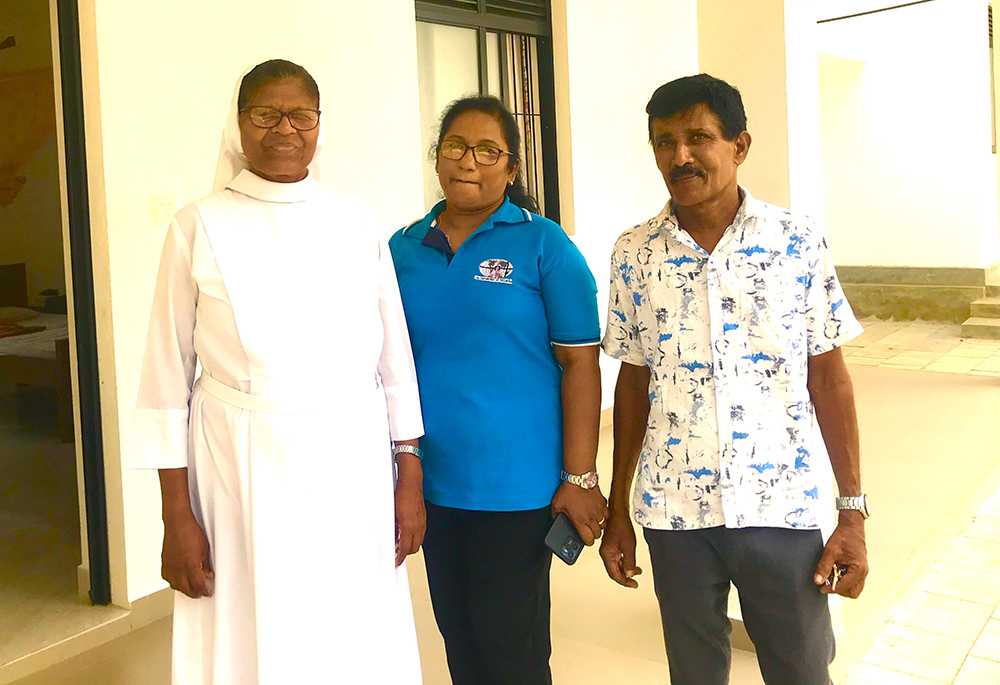
Lay leaders of the Salvatorian Lay Association in the Kurunegala region of Sri Lanka; Pictured from left to right are Jerry Seneviratne, president; Ramani Seneviratne, his wife and a lay Salvatorian; Renuka Damayanthi, national secretary of the association; and Christie Fernando, her husband and a lay Salvatorian. (Thomas Scaria)
On Wednesdays, a group of cancer patients in a government hospital in a central Sri Lankan town wait for their friends in black pants and blue T-shirts.
"They bring so much love and care along with homemade food and medicine," said one of them, Nuwan Sirisena. Although he does not know his friends' identity, he finds them "kind and caring people."
Sirisena, in his early 50s, refers to the Lay Salvatorians, a laity group in the Salvatorian family involved in caring for the sick, poor and homeless.
Jerry Seneviratne, a lay Salvatorian, says they visit the oncology ward of the Teaching Hospital in Kurunegala, some 65 miles northeast of the national capital of Colombo, every week to share what they have. "But the patients value our presence more than what we give," he told Global Sisters Report.
He and his wife, Ramani, are dressed in black pants and blue T-shirts embossed with the "Lay Salvatorians" emblem.
Soon, other group members came to the couple's house to prepare food for some patients with mental illness undergoing treatment in a hospital at Uhumeeya, 6 miles away.

Lay Salvatorians pray together before leaving to serve cancer patients at the Teaching Hospital in the Kurunegala region of Sri Lanka. (Courtesy of Renuka Damayanthi)
Salvatorian Sr. Pauline Pieris, the lay association's Sri Lankan pioneer, says laypeople were part of their founder Fr. Johann Baptist Jordan's mission. The German priest started the Salvatorian Lay Association in the late 19th century.
"In fact, Father Jordan wanted a worldwide movement of laypersons as apostles before he founded the Salvatorian religious congregations," the 78-year-old nun told GSR.
The priest, later known as Francis Mary of the Cross Jordan, called the lay group "third degree members."
The first branch is the Society of the Divine Savior for priests, the second is the Congregation of the Sisters of the Divine Savior and the lay association is the third, known as the International Community of the Divine Savior.
There is a long history of third degree or third order members in the Catholic Church, sometimes known as tertiaries. According to the publication Give Us This Day, a young couple approached St. Francis of Assisi and asked for a way to follow his path without having to separate to enter religious life. St. Francis, who had wanted a "Third Order" for laypeople, clothed the couple in the "plain habit and cord of the order," and they became the first tertiaries in the Franciscan order.

Lay Salvatorians prepare food for distribution at the cancer patients' hospital in Kurunegala, Sri Lanka. (Courtesy of Renuka Damayanthi)
Pieris explained that Jordan was not directly influenced by Franciscan spirituality, and had his own vision and spiritual base that guided his mission among the laity.
The laity has enjoyed equal status as an integral part of the Salvatorian family from the beginning, Pieris said.
In the initial years, when Jordan started this movement for laity in the late 1800s, around 1,000 lay members served in the Vatican and other European countries, she added.
In 1883, Jordan was asked to limit his work to religious priests, brothers and nuns, and gradually, the laity wing diminished. It was only after the death of Jordan that the Vatican recognized his vision of laity, and eventually, the Salvatorian laity gained momentum.
The Second Vatican Council in the 1960s also encouraged the laity involvement in the church's evangelization mission, explained Pieris, who has served in the congregation's general council and as the Sri Lanka provincial.
According to the Dicastery for the Laity, Family and Life, which recognized the Lay Salvatorians as an International Association of the Faithful in 2023, there are currently more than 1,800 Lay Salvatorians in 18 countries across several continents, including Asia, Africa and the Americas.

Salvatorian Sr. Pauline Pieris, who initiated the Lay Salvatorian association in Sri Lanka, at her St. Joseph's Convent in Wattala, near Colombo (Thomas Scaria)
Pieris started the Sri Lanka lay group 25 years ago with six women, mostly former Salvatorians. She began by identifying and motivating Salvatorian nuns who had left the congregation or those women who underwent formation but did not become nuns.
"We have a limited number of nuns in Sri Lanka, so the Lay Salvatorians are a great strength to us," she told GSR.
The island nation now has around 100 members spread over four regions — Negombo, Chilaw, Kurunegala and Mannar.
Renuka Damayanthi, national secretary of the Lay Salvatorians in Sri Lanka and a member of the Kurunegala group, says their service to the needy "begins when we cook for them."
Damayanthi, in her 40s, is among several housewives serving as Lay Salvatorians. Her husband, Christie Fernando, also joins her mission.
"In Kurunegala, we work closely with the Salvatorian nuns' provincial house, besides running our own projects," the national secretary told GSR.

Lay Salvatorians, Renuka Damayanthi and her husband Christie Fernando, are pictured with Sr. Dulcie Fernando, former provincial of Salvatorians in Sri Lanka. (Thomas Scaria)
The laity group, she added, considers their work as a special vocation. The members make a final commitment after mandatory training and formation for one year. Formation is held in convents and has eight modules or sessions, and orientation to social apostolate. Trainees also undergo retreats in Salvatorian spirituality.
Although the members come from different backgrounds, they remain united, sharing the same charism under the banner of the Society of the Divine Savior.
Seneviratne, the Kurunegala group's president, uses his home for their meeting. The house has a large kitchen with modern equipment for cooking.
Advertisement
During the COVID-19 pandemic, they arranged ration kits, besides providing wheelchairs to several patients with disabilities, he said.
"So far, we have done all this with our resources and public donations," Seneviratne said.
He says they have more access to government hospitals, rehabilitation centers, streets, markets and other religions than Catholic nuns and priests.
"Since we live in society as one among them, we could easily get into their lives as ordinary laypeople than priests and nuns who have a special status in society," he explained.

A slogan from the founder of the Salvatorians, Fr. Francis Mary of the Cross Jordan, is printed on the back of T-shirts worn by the Lay Salvatorians in Sri Lanka. (Thomas Scaria)
Several Buddhists collaborate with the Lay Salvatorians or donate to their works. Sachindra Lokumarabaghe, a Buddhist baker who donates around 250 buns to the lay Salvatorians to distribute in the hospital, says kindness to fellow humans is central to their traditions.
"Humanity is above all religions, and we have no problem in working with Christian friends in reaching out to the needy," he told GSR.
Koushallya Nayananda, a retired doctor who serves in cancer and mental hospitals, is amazed at the Christians' zeal and commitment to serving the poor.
"I, too, join them and do whatever I can," the older Buddhist woman, who donated medicines and a video projector to the hospital, told GSR.
Seneviratne says their collaboration with other communities helps increase their Christian visibility. "We are able to witness Christ through our actions."

Salvatorian provincial Sr. Shiroma Kurumbalapitiya, center, is pictured with the two nuns who made their final profession on April 6 at their provincial house in Kurunegala, Sri Lanka. (Thomas Scaria)
On April 6, some lay Salvatorians attended the final profession of two Salvatorian nuns at the provincial house in Kurunegala.
"This is a happy occasion as our family is getting two more consecrated members," said Damayanthi, who introduced GSR to the provincial and senior nuns.
Salvatorian provincial Sr. Shiroma Kurumbalapitiya said the Lay Salvatorians are involved in education, community development programs, housing, health care, catechism and home visits.
Sri Lanka's lone Salvatorian province has some 79 nuns living in 15 convents.
Sr. Rani Fernando, a senior nun who has involved the laity in her projects, observes that in some situations, the laity can do better than the nuns. "They are easily available, enthusiastic and committed."
The lay associates in Kurunegala have worked with Sr. Dulcie Fernando, the nuns' two-time provincial, to build a home for the aged that opened recently.

Lay Salvatorian Ramani Seneviratne, in blue T-shirt, shares a lighter moment with the sisters during the final profession of two new Salvatorian sisters at the provincialate. Also pictured are Sr. Rani Fernando, left, and Sr. Shiroma Kurumbalapitiya, provincial. (Thomas Scaria)
She told GSR that she finds the laity flexible and accessible and has acceptance in interreligious groups.
Mary Margaret, a Salvatorian laywoman in Puttalam, about 85 miles north of Colombo, is involved with the nuns' housing projects for widows and victims of civil war and natural calamities.
The businesswoman and mother of a Salvatorian priest in Sri Lanka told GSR that she provided housing materials at a cheaper rate and helped build two houses as a lay Salvatorian initiative.
"I feel real joy whenever I am involved with the sisters as a Salvatorian family member," said the lay Salvatorian who belonged to the Chilaw unit.
The Lay Salvatorians in Sri Lanka have an executive body with a president for their national and regional units to make important decisions, manage funds and function as a registered body.
Nimal Ignatius Perera, the group's national president based in Negombo, told GSR that his main mission is to strengthen the association with Salvatorian spirituality and function more independently.

Nimal Ignatius Perera, national president of the Lay Salvatorians in Sri Lanka, is pictured at his office in Negombo, a town in Sri Lanka. (Thomas Scaria)
"We used to have our monthly meetings in Salvatorian convents, but now we meet in members' houses, and sisters also attend it," he said.
"Not that we intend to distance from the nuns, but we want to strengthen our group with its own identity and vision."
The Sri Lanka lay associates host the annual Salvatorian Family Day, where nuns, priests, brothers and lay people attend as the same family.
During the gathering, new members make a final commitment after their one year of formation, Perera said.
The lay Samaritans' annual world meeting is scheduled for October in Spain, and some Sri Lankans plan to attend it.
Pieris says the future of the church's missions depends on laypeople and that their laity group has the potential to carry on the Salvatorians' mission in Sri Lanka.
"We are worried about the decreasing vocations to religious life, but we are hopeful when we see the laity group's increasing involvement in our mission," the pioneer added.





